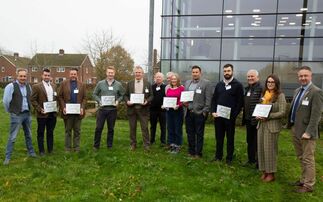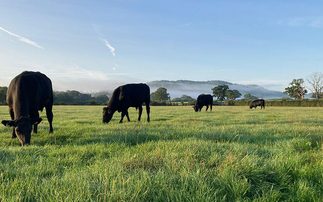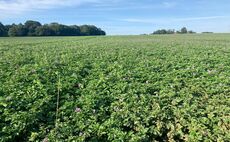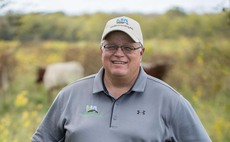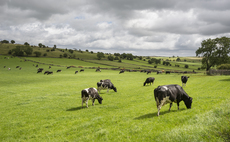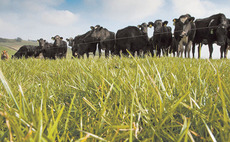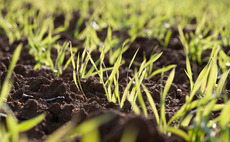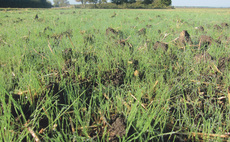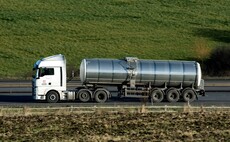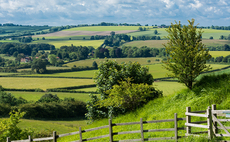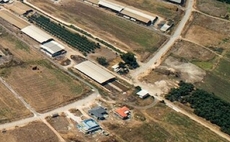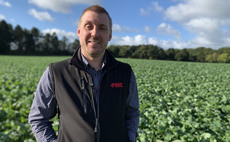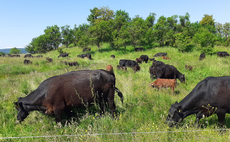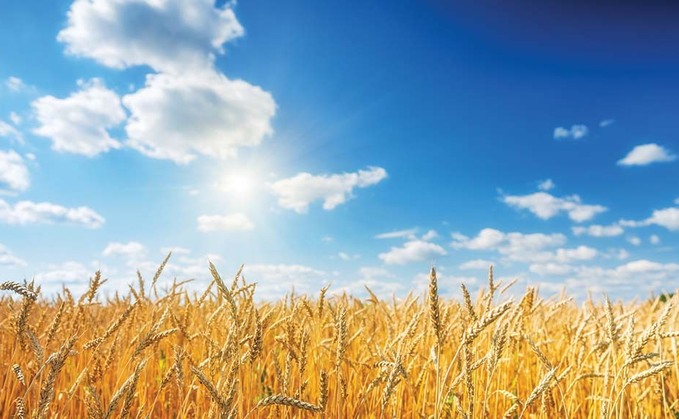
Eight finalists have been announced in the School of Sustainable Food and Farming Journey to Net Zero competition. Launched in late summer, the competition is looking to support the development or implementation of a sustainable farming system, process or processes. There is a total of 50,000 grant funding available which will be awarded in sums of between 5,000-20,000.
Ben Adams - Improving soil carbon through polycropping
Ben Adams farms on a diversified arable cropping farm of 380 hectares in Bicester, farming combinable crops and processing and delivering firewood over the winter months.
The farm has been trialling intercropping and would like to win an SSFF grant to further this work. Ben Adams explains his plan would be to trial a range of different crop species together in the spring after a multispecies cover crop to find what works financially, rotationally, to monitor issues which arise with pests, weeds and disease, assess how best to manage the different crops, and calculate how little inputs can be applied to them. Ben says he would also like to monitor levels of sequestered carbon and natural capital gain.
There are several combinations I would like to try, including: peas/barley, peas/osr, peas/barley/osr, beans/oats, beans/osr, oats/osr, beans/oats/osr. Further mixes could include combinations of linseed, mustard, vetch and many more. The amount of different trials and scale will depend on the amount of funding offered.
As there is no weighbridge on farm, Ben says he would also consider the possibility of yield mapping on the combine in order to more accurately quantify the yields from different plots.
He explains: The main reason for funding is due to the amount of trial work which will need to be done and considerable management time for all the different crops. Also the separating of these crops after harvesting via a rotary cleaner.
The profitability of these crops also comes into play as over the last two years the pea/oat intercrop has averaged around 250/ha compared to monocrop spring oats which achieved 991/ha this year which means in order to conduct these trials over a decent area (16.8ha) it is likely to cost the business around 12,500 which is a serious impact to the business.
I am hoping that after the trials are all done it will be a lot more clear as to which combinations of crops will be financially viable.
Andy Bradford - HedgeGrow?
Andy Bradford is a Duchy of Cornwall second generation tenant with the existing tenancy starting in 1969 at Brimpts Farm. It is 282 hectare Dartmoor hill farm comprising a beef enterprise, Adventure Clydesdale which includes a breeding programme and long distance horse riding; and a conference centre, accommodation and camping.?
In 2009, Andy decided that it was time to reduce the Brimpts Farm carbon footprint with the installation of a biomass boiler. The project was a great success and Brimpts farm subsequently became the site of The Dartmoor Woodfuel Cooperative (DWFC), which was setup in 2009 by a local group of Dartmoor residents and with support from the Duchy of Cornwall. ?
The cooperative has grown and now supplies nearly 40 local installations with around 10,000 cubic metres of woodchip biomass per year. ?
Their application is to fund the assessment of hedgerow wood chips after it was recognised that hedgerows may be a suitable source of woodchip but the full-scale impact of this on biodiversity; replacement of bought in straw bedding; and reducing bought in mineral fertiliser from the use of composted chips needs to be measured. The objective of this project is to determine the impact of hedgerow woodchips in terms of carbon emission reductions, provision of enhanced hedgerow habitats as well as financial benchmarks.?
Mr Bradford explains: Hedgerows are an undervalued resource on farm. Alongside their value for biodiversity and shelter, the large production of hedge biomass each year could be sustainably harvested for wood chip. Pilot trials on Brimpts farm on Dartmoor have demonstrated that woodchip can be used for biomass boilers and for the creation of woodchip livestock bedding.?
Sustainable harvesting of hedgerows which maintains biodiversity through the management of large growth, offers a potential alternative to imported straw in grass-dominated landscapes; wood fuel from a local managed resource; and composted dirtied wood chips could replace a proportion of bought-in mineral fertiliser.?
James Baird - Supplementing nitrogen through soil biodiversity for Milling wheats
James Baird farms a 500-hectare arable farm in the coastal town of Littlehampton, West Sussex, growing all milling wheat, oats, seed peas for birdseye and OSR. He is also a co-founder of the Weald to Waves initiative, an ambition to create 50 miles of nature corridors connecting our restored kelp forests to the Ashdown Forest. Mr Baird says is goal is to farm efficiently within a nature vibrant landscape.
He would like SSFF funding to further his trial work to eliminate insecticides. It is proving challenging especially in peas due to aphid pressures.
It has taken 15 years to build soil organic matter and following a trial last year we are now confident to move to direct drilling within the next three years. I want to reduce my artificial Nitrogen use whilst continuing to grow higher protein milling wheats. I also want to massively improve soil biology through the use of cover and companion crops and compost teas. I think these objectives are all achievable and scale-able.
If successful in the competition, he says he will undertake more trial work including harvest and post-harvest evaluation, evaluation of the ability to achieve marketable protein and retention of N in the soil.
Working with the AICC I want to expand my trials including multi-year clover companion cropping, Im particularly interested in knowing the long term effect this will have on our ability to continue to grow peas within our rotation, as there is a perceived incompatibility which requires a six-year break in pulse cropping.
I would like to trial various compost teas to help identify beneficial bacteria and fungi which could reduce the break crop time for legumes from six to five to four. This would make a massive difference to soil nutrition and farm sustainability.
HotStuff
J.R. & H.J. Jones & Sons farm 81-hectares of predominantly grassland on the flood plain of the Rivers Severn and Vyrnwy.
Last year the business converted from a mixed farm to dairy. Farmer and environmental consultant Mandy Stoker explains: We are embracing sustainable solutions installing new technology and working with nature. We invested in a new high-tech, energy efficient, herringbone parlour and bought 200 in-calf heifers last summer. We aim to milk up to 500 cattle within the next two years.
They would like funding to construct a system to heat warm water for feeding calves, and cleaning in the parlour (CIP), by using microbial activity through composting farmyard manure (FYM). This will lower the current energy requirements.
We will take used bedding from the cattle sheds, which comprises manure and chopped straw, and place into a purpose-built composting vessel. A series of water-filled hosepipe-based units will run through the compost. The energy and heat generated by the microbial community will warm the water. The water can then be drawn off twice a day during feeding times.
The energy required for heating water is significant but we believe we can put in a system that fits in with our whole farm business and contribute to the circular economy. The compost will be monitored and managed to ensure microbial efficiency.
Whilst this idea is not new (Smith, 2017), it has not had the interest that it warrants possibly because other renewable technologies have taken precedent. However, for us (and possibly other livestock farmers) it will fit in with our other farming activities and should be relatively low cost, low maintenance and have low carbon footprint.
The funds will be used to fabricate the heat exchange system which needs to be robust, practical, adaptable and heat the volume of water required.
Ryan McCormack, Dennington Hall Farms
Ryan McCormack, farm manager at Dennington Hall Farms has big plans and number of objectives hes keen to gain funding to help him achieve.
Dennington Hall Farms is predominantly an arable farm, farming over 1,200 hectares of combinable crops and sugar beet in Suffolk on mostly sandy clay loams (SCL). There are also 40 suckler red poll cattle which graze the meadows surrounding the farmyard, 80ha of woodland which is coppiced and thinned and provides woodchip for the two biomass boilers at the farm and at Bruisyard Hall, a wedding venue also owned by Dennington Hall, and several residential and commercial properties.
Mr McCormack has outlined five main things hes keen to achieve:
Firstly, to accurately measure our total carbon footprint, core sampling the fields to see how much carbon we are storing.
Secondly, we will develop a robust biological nutrient plant, something like a large scale Johnson Su system where we can brew our own biological tea, and reduce the artificial N requirement.
Thirdly, capturing energy and nutrients from cover crops and cover crop destruction by purchasing a crimper roller, which will roll down and crimp the cover and the second approach would be to purchase electric fencing and strip graze sheep/livestock.
Fourthly, I would like to use a small proportion of the funds towards trials, using Endophyte seed dressing, coupled with bio stimulants, alongside a new product called R-LEAF which will hopefully take Nitrous oxide from the atmosphere and turn it in to a nitrate that can be absorbed by the crop.
Fifth, depending on the amount of funds available, I would like to see a start made with the drone technology, monitoring, measuring crop growth and development, and applying nutrients.
Growing Potatoes whilst improving Soil Functionality?
Herefordshire business E.C. Drummond grows?324ha?of processing potatoes, with the majority going to into the frozen chip market. Over the last 10 years, they have adapted and evolved their potato growing system to have less impact on the soil. ?
Grower Ben Drummond explains: This started with removing stone separating where possible. This was originally to do with expense but we then started to see benefits from having a less worked soil. Cover cropping was introduced at a similar time, and it became apparent that soils which had had a cover crop, worked down more easily in the spring than those without.?
We have now moved to a system of minimal passes following cover crops. This involves the establishment of a cover crop in the autumn, this is ideally grazed over the winter, if not it is mown off post December. We try and avoid the use of a herbicide for cover removal. Ideally, we then have 1-2 passes with a Sumo Trio to create a seed bed, and then plant direct into that with a AVR powered planter. Our aim is to establish everything with one powered pass.?
The business now believes regenerative principles are the foundations of future potato growing and Mr Drummond says machinery to remove weeds will be key to success. He says adoption of timely weed control with machinery matched to planting and harvesting configurations will allow reduction in the use of herbicides. ?
The SSFF funds would therefore be used to help purchase machinery to develop the area of potatoes grown under fully regenerative principles on the farm. The availability of such machinery would then allow other growers to investigate the potential of growing potatoes under regenerative principles and expand the area further as the capacity of the machine will allow for use outside of the E.C. Drummond farming business.?
Investigating the best techniques to create and apply biochar using crop waste
Climate Spheres UK (CSUK) is a UK based start-up, formed with the aim to help farmers to become more sustainable and resilient to the impacts of climate change.
The business has been working with one 130-acre sheep farm in South West Wales in particular, as well as other farmers to develop a process to use crop waste to produce biochar which can be applied back to fields. This provides a climate-friendly soil enhancer that can reduce CO2 emissions directly by sequestering carbon and indirectly by reducing the need for standard fossil fuel fertilizers.
Biochar also offers a number of co-benefits including increasing soil carbon and crop yields, improving water retention (increasing resilience to both flooding and droughts), and absorbing soil pollutants. We are developing the processes to use carbon credits from applying biochar, to subsidise the biochar production and application.
This also offers a diversification opportunity for farmers by providing additional sources of income in the form of carbon credits and moves farmers to a circular economy by reducing waste and improving farm efficiency.
With this funding the group would aim to work with the partner farm to develop the on-farm processes farmers could follow to gather crop waste, produce and apply biochar to fields and generate carbon credits by working through the following stages:
- Analyse how much biochar can be produced
- Baseline analysis of the farm and soil health
- Experimentation of best process to apply the biochar
- Monitoring the impact of biochar
- Collate results and produce an information package to inform other farmers
Alternative fertiliser plan for beef and sheep system
Messrs T.I. Wetherell and Son is a family farm in Cumbria with a beef and sheep enterprise looking for funding to research the production of natural fertilisers.
The farm is 283 hectares in size with 50 cows (100 followers) and 1,000 breeding ewes. Around 90 per cent of the farmland is permanent pasture and the remaining 10 per cent is made up of temporary leys and woodland.
The farms herd of pure Herefords are raised on a grass-based system and are grass finished. A minority of the lambs are cereal finished but we are looking to move onto a 100 per cent grass-based system with improvement of soil health and increasing grass mix diversity.
Megan Wetherell explains Our current fertiliser plan is using NPK compound fertiliser combined with farmyard manure (FYM) and slurry. Due to synthetic fertiliser prices over the past year, we relied solely on FYM and slurry which yielded a sufficient amount of grass for hay and silage for the coming year.
However, the success of this year is likely due to the great growing conditions that we were fortunate to have in Cumbria. This is unreliable for the future and we are therefore looking into an alternative fertiliser plan which does not require synthetic fertilisers. Not only do we think this will be cost beneficial but will also help towards the sustainability aims of the farm.
In the past they have also explored the option of using biosolids and chicken manure didnt deem it viable.
The funds will be used to explore the production and use of natural fertilisers made from plants including, but not limited to, comfrey, calamint and nettles. The plan is to grow the plant, process into liquid fertiliser and deliver onto the soil. Every stage of the process is to take place on the farm to make it part of the farms system.
Which project would you award the funding to: ?https://www.surveymonkey.co.uk/r/J96H2MZ












